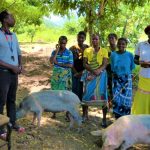
With funding from the Tilitonse Foundation, LICO is championing health governance interventions Rumphi district, working with young people aged between 10 and 24 years old. The project is titled empowering Citizens to Safeguard Medical Supplies in Rumphi District, aiming at increasing transparency and accountability in the acquisition, distribution and utilization of medical supplies at DHO and health facilities in the district. Specifically, the project intends to promote meaningful engagement of the beneficiaries of the medical supplies with the health workers in order to monitor and track the management of the medical supplies and reduce loss through theft.
The core problem that the project seeks to address is inadequate access to youth friendly health services and Sexual and Reproductive Health products among adolescent girls and young women in Rumphi district. Despite health centres receiving medical supplies, pilferage of medical supplies, such as condoms, drugs and equipment, decreases access to quality and equitable SRHR services.
Malawi’s media is regularly awash with incidences of health commodity theft and drug expiry. Over the last few years, research has quantified the magnitude of drug theft as well as identified the networks and processes that facilitate theft. This evidence suggests that most abuse is occurring at health facilities, often in collusion with the health care workers who are entrusted to safeguard health commodities and ensure they reach their intended beneficiaries.
In Rumphi, inadequate access to the SRHR services is evidenced by high rates of teenage pregnancies that lead to child marriages. At 34.1%, child marriages in Rumphi are alarmingly high. The district is registering many teenage pregnancies. More children are getting married before the age of 18 years. Access and uptake of SRHR services is very low amongst girls and young women of reproductive age. There is high school dropout rate among the girls because of child marriages and teenage pregnancies. Figure 1 below shows the number of girls dropping out of school due to either pregnancy or child marriage in few sampled schools.
Thus, the project is empowering the rights holders, the adolescent girls and young women (AGYW), with knowledge and agency to demand accountability and transparency in the management of the medical supplies. AGYW will be empowered beyond voice and action, to track the health budget and monitor the distribution and utilization of the medical supplies to reduce pilferage, thereby promoting access to the SRHR services.
The project is also enhancing meaningful involvement, inclusion and participation of the AGYW in the Health Centre Advisory Committees (HCACs).
The project is also building the capacity of the AGYW to demand accountability, transparency, equity and quality in the provision of SRHR services for Youth Friendly Health Services.
Ultimately, the project would like to yield the following results;- increased involvement, inclusion and participation of AGYW in the governance processes leading to increased demand for accountability and transparency in acquisition, distribution and utilization of medical supplies; improved engagement between Health Centre Advisory Committees and the DHMT and health workers leading to increased responsiveness in service provision; enhanced accountability in the distribution and utilization of medical supplies leading to reduced pilferage; and increased access to Youth Friendly Health Services among the AGYW.



